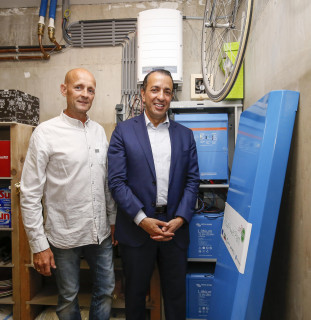The Amsterdam Virtual Power Plant, in which around 50 households jointly trade the energy from their home batteries, has been nominated for Eurocities’ Green Digital Charter Award.
The Amsterdam Virtual Power Plant, in which around 50 households jointly trade the energy from their home batteries, has been nominated for Eurocities’ Green Digital Charter Award. Since the summer of 2017, the solar energy that is not used immediately, is stored in a battery at home. This energy can be used at another time, or can be traded if the energy price is high. Conversely, energy can also be purchased and stored if the price is low. Finally, the batteries can be used to balance the local electricity grid. The Virtual Power Plant is part of the City-zen project and is coordinated by Alliander and Greenspread.
Watch the video: City-zen Virtual Power Plant
Alliander Virtual Power Plant with subtitles Embed
Bristol and Dublin have also been nominated
In addition to Amsterdam, projects from Bristol and Dublin have been nominated. In Bristol, peak consumption is reduced by smart charging of electric cars. In Dublin, residents and sensors work together to prevent air pollution in a cheap way. The winning project will be announced during the'Imagine the Urban Future: Innovation Collaboration and Trust’ conference in Brussels on 23 January 2018.
What is the Green Digital Charter?
The Green Digital Charter was launched in 2009 by Eurocities in collaboration with Manchester and Clicks & Links. The Charter is now supported by the European Commission and signed by 50 cities from 21 European countries, including Amsterdam. These cities indicate that they want to achieve the EU climate goals with innovative digital solutions. The cities share best practices and results with each other, build local partnerships and ensure that digital innovation becomes part of urban policy. Above all, every city aims to start 5 large-scale and replicable ICT projects within 5 years of signing and reduce the Carbon Footprint of the urban ICT sector by 30%.
What has happened in Amsterdam so far?
One of the large-scale initiatives launched in Amsterdam is City-zen, a European-funded project in which 25 partners find out in practice how the cities of Amsterdam and Grenoble can drastically reduce the use of fossil energy in the built environment. In addition to the Virtual Power Plant, homes are being renovated to reduce its’ energy use, cold is being extracted from a drinking water pipeline and river cruise ships are supplied with local green energy.
Digital innovation is a focal point of the municipality and many other parties in Amsterdam . The municipality has now started a CTO office, to get technology in the capillaries of its own organization. The cooperation of parties in Amsterdam Smart City focuses on realizing concrete innovations in the city. In Green ITpeople work on innovations to make the ICT sector more sustainable.This knowledge is shared with other cities through various Eurocities meetings around this theme. Amsterdam also participates in the smart city technical experts group.
Reducing the emissions of the ICT sector in Amsterdam is not yet a fait accompli. The capacity of the Amsterdam data centers grew by 30%last year, and is now the second hub in Europe. A covenant was signed in 2013 to reduce 15% energy consumption.
Amsterdam had been nominated for the Green Digital Charters Award before, in 2016, then with the project Open Data – Smart Neighbourhoods.





